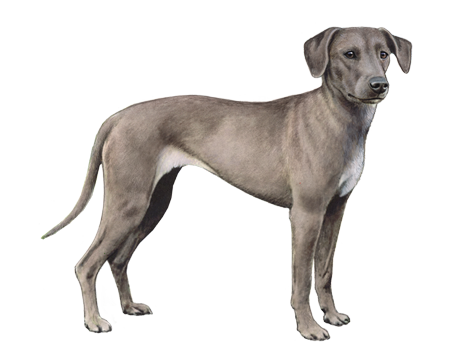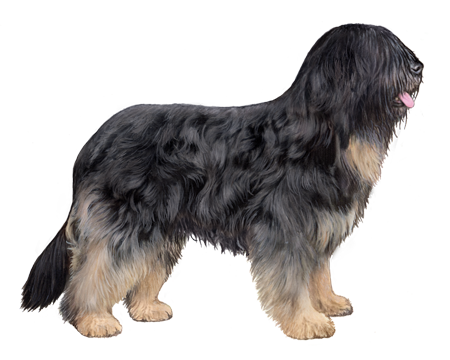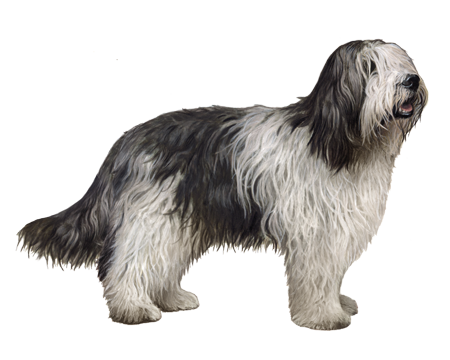
Kuvasz
The Kuvasz is a fearless livestock guardian that makes a vigilant watchdog. These fierce protectors are energetic, alert, and powerful but also sweet-natured with their families.
Interested in discovering if your dog is a Kuvasz?
Check out Wisdom Panel's DNA tests.
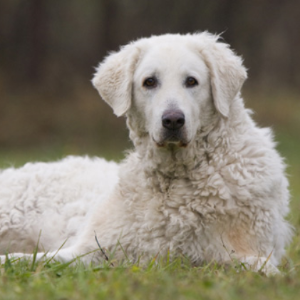
Kuvasz Traits
General Appearance
Kuvaszok are large, muscular dogs that are strong, agile, and quick on their feet. These medium-boned dogs show no hint of bulkiness.
Coat and Coloring
Kuvaszok have double coats, composed of fine undercoats and medium-coarse outer coats with guard hairs that range from straight to wavy. Their hair is short and smooth on their heads, muzzles, ears, front of the forelegs and hindlegs, and paws; it is longer on their necks, forming a mane that covers the chest. The backs of their forelegs and tails have significant feathering that can grow up to six inches long. The length of the coat changes with the seasons; Kuvaszok tend to lose most of their long hair during hot weather.
Kuvaszok have white coats. Their skin is heavily pigmented with the breed standard favoring slate gray or black pigmentation.
Distinctive Physical Traits
Kuvaszok are large dogs with a rectangular shape; their withers are higher than their backs, their shoulders are muscular and long, and their thighs are muscular and strong, allowing them to move with a free, easy gait.
Kuvaszok have beautiful heads with elongated skulls, lean muzzles, V-shaped ears with slightly rounded tips, and almond-shaped, dark brown eyes set well apart.
Kuvasz Temperament
The same traits that made Kuvaszok prized livestock guardians also make them devoted watchdogs. These pups are intelligent, determined, courageous, and have strong protective instincts. Kuvaszok will do anything to keep their homes and families safe. They are especially protective of children.
Thanks to their strong protective instincts, the breed can be standoffish with strangers. Kuvaszok take cues from their owners and will be polite with accepted strangers.
Kuvaszok might not be overly affectionate but these dogs develop intense bonds with their families.

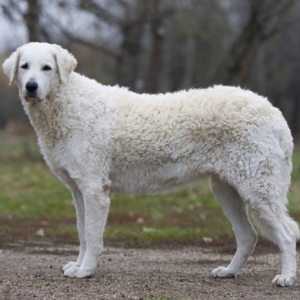
Kuvasz History
Although the Kuvasz can trace its roots back to Asia, it is considered a Hungarian breed that arrived on the European continent in the Middle Ages. Bred as livestock guardians, Kuvaszok (the plural of Kuvasz) moved across wide expanses of rugged terrain, watching their flocks and defending against predators.
The fierce protectors attracted the attention of Hungarian King Matthias I, who appreciated their strength, skill and courage, and made them a fixture of his palace. Legend says that the monarch trusted his Kuvaszok more than his palace guards.
Kuvasz Care
Nutrition
Feed Kuvaszok a high-quality dog food that is appropriate for their life stage (puppy, adult, senior) and consider a diet formulated for active breeds. Portion out their food with a measuring cup and limit treats to no more than 10% of their daily calories to avoid overfeeding. Kuvaszok, like other large breed dogs, are at higher risk for bloat. Offering several small meals per day (as opposed to a single large meal) could reduce the risk.
Grooming
Brush Kuvasz coats at least once per week to remove dead hair. These dogs will shed during semi-annual “shedding seasons” and daily brushing is essential to remove all of the dead hair. Occasional baths will keep Kuvaszok clean and smelling fresh.
Regular ear cleaning and nail trimmings to prevent cracking, splitting, and painful overgrowths are important and regular dental care that includes at-home teeth brushing
Exercise
Kuvaszok were bred as working dogs and thus require daily exercise. These dogs love spending time with their owners and will see exercise as a bonding experience. Invite them along on hikes or bike rides. Regular walks or games of fetch or hide and seek in a fenced backyard are also a great way to provide the mental and physical stimulation that Kuvaszok need to be healthy and happy.
Training
Kuvaszok mature slowly and require consistent training, starting when they are puppies, to help them grow into well-mannered dogs. The smart, eager-to-please breed requires patient owners willing to use positive reinforcement and rewards, not harsh training techniques, to help them master basic commands and learn new tricks. Socialization is essential to help these dogs temper their guarding instincts and feel more comfortable with strangers.
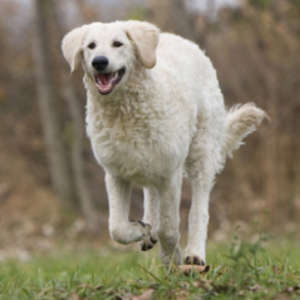
Breed Group
Herding
The herding group is a diverse category. These highly intelligent breeds were developed to guard and control the movement of livestock.
Resources
https://www.akc.org/dog-breeds/kuvasz/
http://images.akc.org/pdf/breeds/standards/Kuvasz.pdf
Reviewed July 26, 2020 by Cindy Elston, DVM, MPH

































